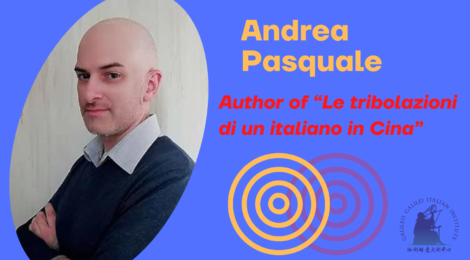
Galilei Circle of Friends – Interview with Andrea Pasquale
Born in Campobasso, Andrea obtained a degree in International and Diplomatic Sciences from the University of Bologna and a Master’s degree in International Relations from the LUMSA University of Rome. Andrea’s passion for travel, exploration and knowledge of other cultures led him to live, work and study in many countries around the world such as Spain, Uruguay, Scotland, Belgium, Japan and finally China, where he lived for ten years. At the end of 2010, he moved to China where he lived for ten years, becoming a point of reference as a teacher of Italian and Spanish and becoming the only CILS examiner in the Chinese province of Hunan. Since 2020 he has returned to Italy with his wife and son and now lives in Pesaro, continuing to teach Italian and Spanish. In addition to teaching, he has also written and published three humorous novels inspired by true stories, all available on Amazon, which have enjoyed good critical and public success: “The Tribulations of an Italian in China” in 2017, “The Boy Who Turned The Wrong Screws Of The World” in 2020, and “Ridatemi il Milione” in 2021.
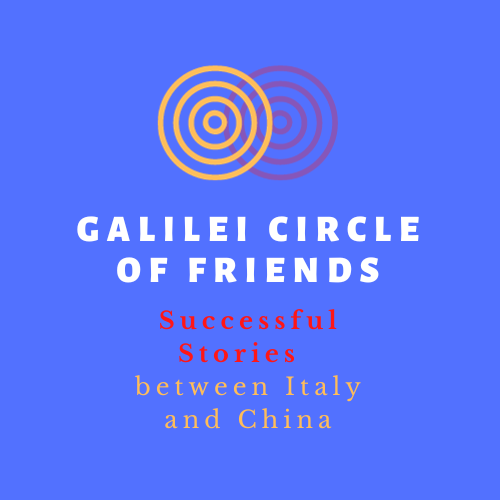
Dear Andrea, welcome to our “Circle of Friends”! What is your relationship with China?
I am Andrea Pasquale, a teacher of Italian and Spanish for various schools in China. I lived in China for ten years, from 2010 to 2020, and then, having remained outside Chinese borders during the COVID period, I settled in Italy where I continue to teach online to Chinese students and students from other countries around the world. During my years in China, I met a Chinese girl whom I married, and with her, I have a child who is currently 6 years old.
Where did you live in China?
I lived for a few months between Beijing and Tianjin, then I moved to Wuhan where I stayed for three years, and finally to Changsha where I lived for seven years and where I still own a house and have a dog from which, unfortunately, I have to stay away.
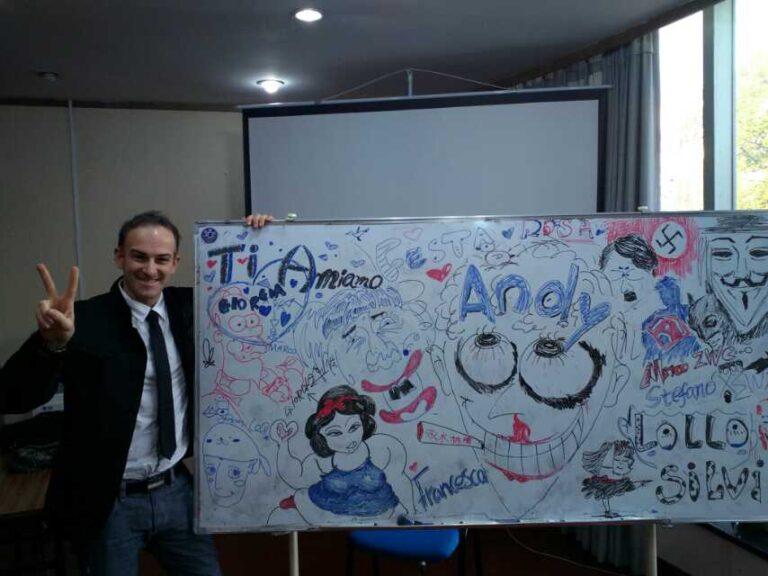
How long did you stay in China? And for which reason?
As I mentioned, I lived in China for ten years but I continue to work for my school. Initially, I came to China for an international cooperation internship which turned out to be a major scam. In the meantime, however, I had started teaching Italian and, after discovering the internship scam, I was hired by a language school first in Wuhan and then in Changsha, where I also became the sole CILS examiner for several years.
Where did you start?
I started working for the internship between Beijing and Tianjin, with a deceitful boss who tried to scam Italian and Chinese universities with fake international cooperations. He paid me, but his methods were shady and questionable. Later, I went with him to Wuhan and then left him to pursue a career as a teacher of Italian and Spanish.
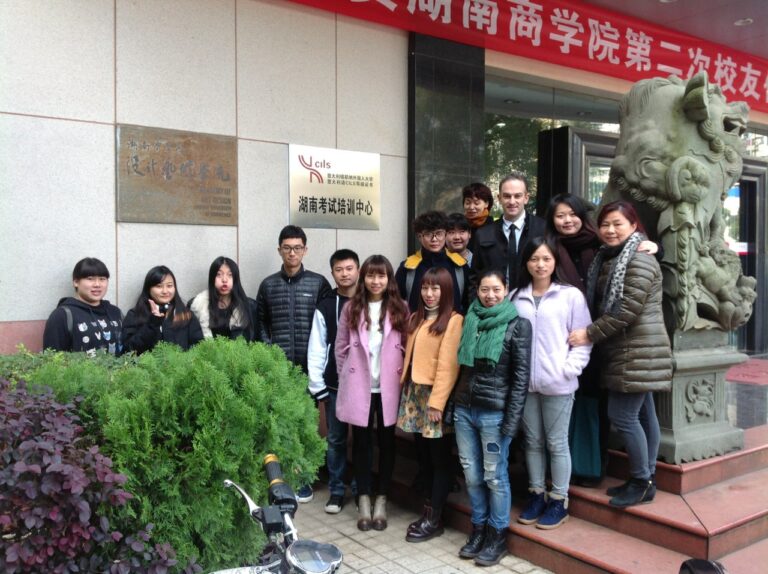
Where did you end up? What was your last city/place in your China experience?
The last city I was in China was Changsha, in Hunan, my wife’s hometown, where we also bought a house and had a child. There I became a CILS examiner, and in 7 years, we sent more than 300 Chinese students to Italy to study at Italian universities.
Could you speak Chinese?
At the beginning, I could not speak Chinese at all; I went to China only attracted by an internship (which later turned out to be a scam) that promised an excellent salary and a great career. Over the years, I learned some Chinese but never studied it seriously, so I have maintained an intermediate level of the language.
Language and culture were a barrier during your stay?
The language was a barrier at the beginning, during the internship/scam, as I didn’t understand well what was happening around me. Once I got past that phase, it was not a barrier at all. I found friendly and open people who made me feel at home. As for the culture, it was never a barrier. Before China, I had lived in different parts of the world, so I was used to dealing with cultures different from my own.
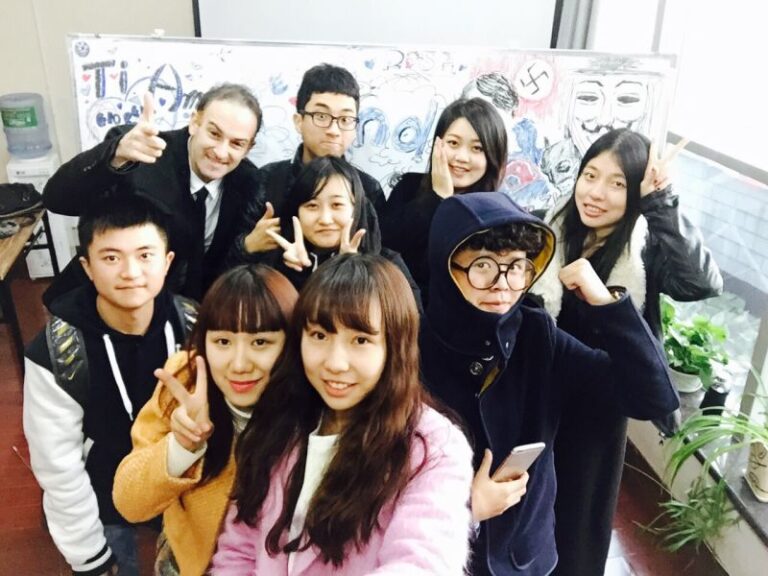
Tell us three main challenges during your experience in China
Three challenges in China? I would say the initial phase, when unfortunately I was involved in the scam, was a challenge that many wouldn’t have endured. As for the second challenge, I believe internet censorship was one of the biggest hurdles for me because I had to struggle with unreliable VPNs and tricks to access basic services that today the internet provides us. Regarding the third challenge, I would say that the spiciness of Hunan cuisine, famous throughout China, has created more than a few problems for my delicate stomach over time.
Tell us three main lessons learned in China
In China, first and foremost, I learned that not everything is as portrayed by our media. China is a fantastic place to live, very modern, with tremendous job opportunities. People are kind and curious towards foreigners, and there is little of the darkness perceived by us. I also experienced firsthand how this respect for foreigners and for the role of the teacher are things completely distant from our culture, which unfortunately has regressed in this regard due to our poor politicians. Lastly, I noticed how in pre-COVID China there was an atmosphere of optimism that has been absent in Italy for a long time. Generations are wealthier than previous ones, there is optimism and trust in the government, people have fun and begin to spend on non-essential goods. And us? Can we truly say we are still the beacon of the world (if we ever were)?
Why did you decide to write a book?
I decided to write the book about my first months in China because whenever I told the story of the internship/scam, it always amused people and sometimes I ended up talking about it for entire evenings. So, I decided to put my tragicomic adventures on paper, thus taking the opportunity to offer the reader a different and unique perspective of China, one that you don’t find in guidebooks or blogs.
How was it welcomed by the Italian audience? Are you planning on a new publication soon?
The book was a small success, having sold nearly two thousand copies so far and receiving excellent reviews from both the public and critics, which frankly I didn’t expect. A few years ago, the book also caught the eye of an emerging director who read it, was struck by it, and wanted to make it into a film. Then, unfortunately, COVID arrived and that project was put on hold. Who knows if it will ever come to fruition. As for other publications, I have written two more books, one of which is set in China again, titled ‘Ridatemi il Milione’. This book, too, is inspired by true events and essentially revolves around the attempt by an Italian entrepreneur to open an Italian-style pub, with all the issues and unlikely situations that ensued. Currently, I’m writing my fourth book, which is not set in China.
Interview by Marco Bonaglia



